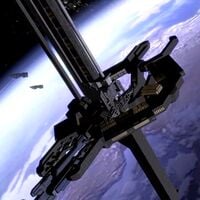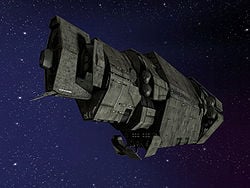Magnetic Accelerator Cannon: Difference between revisions
From Halopedia, the Halo wiki
| Line 12: | Line 12: | ||
== Super Magnetic Accelerator Cannon == | == Super Magnetic Accelerator Cannon == | ||
Super MAC guns are loaded on defense platforms orbiting [[Reach]], [[Earth]], and other strategic locations that must be protected, and are much more powerful than normal MACs. The Orbital MAC guns (nicknamed "Super MAC" or "The Big Stick") which are capable of accelerating a 3000 ton ferric-tungsten round to 40% the [[Wikipedia:Speed of Light|speed of light]] and can reload in five seconds. These weapons are able to destroy a Covenant warship with a single shot (one projectile from a "Super" MAC gun will literally shatter a Covenant ship even with full shields) and are commonly placed in geosynchronous orbit around a planet over the location they are named after. | Super MAC guns are loaded on defense platforms orbiting [[Reach]], [[Earth]], and other strategic locations that must be protected, and are much more powerful than normal MACs. The Orbital MAC guns (nicknamed "Super MAC" or "The Big Stick") which are capable of accelerating a 3000 ton ferric-tungsten round to 40% the [[Wikipedia:Speed of Light|speed of light]] and can reload in five seconds. These weapons are able to destroy a Covenant warship with a single shot (one projectile from a "Super" MAC gun will literally shatter a Covenant ship even with full shields) and are commonly placed in geosynchronous orbit around a planet, often over the location they are named after. | ||
The one weakness of the orbital MAC guns is that the power stations that power them are located on the surface of the protected planet, and are thus susceptible to attack from Covenant ground forces. The pious nature of Covenant engagements have also presented a problem, since the Covenant are more than willing to sacrifice a number of ships in order to destroy one platform. This tactic was used during The Battle for Reach. | The one weakness of the orbital MAC guns is that the power stations that power them are located on the surface of the protected planet, and are thus susceptible to attack from Covenant ground forces. The pious nature of Covenant engagements have also presented a problem, since the Covenant are more than willing to sacrifice a number of ships in order to destroy one platform. This tactic was used during The Battle for Reach. | ||
Revision as of 12:57, December 15, 2006
The Magnetic Accelerator Cannon (or MAC gun) is the standard main weapon of all UNSC cruisers, destroyers and frigates, and much larger versions are the main weapons onboard UNSC orbital defense stations. The MAC gun is stated as the UNSC's most powerful non-nuclear weapon.
All Magnetic Accelerator Cannons are built into the structure of a ship or weapons platform. Thus, to aim the cannon, the ship or the platform must maneuver to be facing the target. Both shipboard and platform versions generally require an AI to aim the cannon, as the slugs fired are unguided. Even taking into account the high speed of the shots and the supreme accuracy with which an AI can aim them, they are highly inaccurate as battles usually take place across 100,000 km or more, allowing Covenant vessels to dodge them. From what is know about the MAC gun, it may be possible to build one with a cannon, superconducting magnets, a lot of power, and a magnetic artillery shell.
Standard Magnetic Accelerator Cannon
The MAC gun uses a linear acceleration system, comprised of several superconducting coils which generate a series of magnetic fields that continually add velocity to a projectile until it leaves the shaft of the MAC cannon carrying a extremely large amount of energy with it. The coils are powered by a series of capacitors that store the tremendous energy necessary to accelerate a heavy projectile to relativistic speeds. Common shipboard MAC guns are capable of accelerating a 600 ton ferric projectile with a depleted uranium core to 10% the speed of light, or roughly 30,000 kps. The main drawback to the shipboard MAC gun is the large amount of time it takes for the capacitors to reach full charge. This drawback has proven to be significant in combat against Covenant warships, since it has been shown that it requires several ship-scale MAC rounds to penetrate Covenant shields. An experimental version of the MAC gun has been developed, however, that is able to fire three successive rounds on one charge. A prototype of this weapon was mounted on the UNSC Pillar of Autumn. MAC guns exist on many different scales, ranging from the massive Mark V "Super" MAC guns onboard orbital defense platforms, to common shipboard MAC guns, and even down to the "Gauss" cannon mounted onboard the Warthog LRV. There are 3 types of shipboard MAC guns, light MAC's being those aboard frigates or destroyer because of their obvious difference in size and heavy MAC's being aboard cruisers, carriers because they are extremely lager that frigates, or destroyers making this possible. The heavy MAC's are just more powerful and use heavier ammo. There is also a Advanced MAC gun used aboard Super Carriers.
Super Magnetic Accelerator Cannon
Super MAC guns are loaded on defense platforms orbiting Reach, Earth, and other strategic locations that must be protected, and are much more powerful than normal MACs. The Orbital MAC guns (nicknamed "Super MAC" or "The Big Stick") which are capable of accelerating a 3000 ton ferric-tungsten round to 40% the speed of light and can reload in five seconds. These weapons are able to destroy a Covenant warship with a single shot (one projectile from a "Super" MAC gun will literally shatter a Covenant ship even with full shields) and are commonly placed in geosynchronous orbit around a planet, often over the location they are named after.
The one weakness of the orbital MAC guns is that the power stations that power them are located on the surface of the protected planet, and are thus susceptible to attack from Covenant ground forces. The pious nature of Covenant engagements have also presented a problem, since the Covenant are more than willing to sacrifice a number of ships in order to destroy one platform. This tactic was used during The Battle for Reach.
The MAC cannons can be found throughout the Halo universe, and play critical roles in many battles. The use of the MAC gun proved decisive when the Covenant fleet descended to Earth at the beginning of Halo 2, and was used as early on as Master Chief's first encounter with the Covenant, in which it was used to blow a hole into the ship through which Spartans could access.
Likely Position of MAC cannon on Halcyon-class Cruiser
While the specific location of a Halcyon-class cruiser's MAC cannon is not known it is most likely near center of the ship. In the Halo books it is said that a UNSC ship's MAC cannon could obliterate a human built vessel with just one shot and severly damage an unshielded Covenant vessel. In order to do this with nothing but magnets and a slug 1.you need multiple powerful magnets 2.there must be sufficient time for the slug to accelerate to the maximum speed. To allow for both of these the whole of the MAC gun most likely runs almost the entire length of a UNSC cruiser's interior. Seeing how long the Pillar of Autumnis there would be plenty of room for the slug to accelerate. Also take into consideration the design of Cairo Station. After exiting the cargo elevator if the player looks up they can see the Super MAC in action. The slug travels through the entire length of the tower and exits at the very top. Next when the player enters the final room on the Cairo Station level they can see the slugs being loaded into the base of the MAC tower before it is fired.
As for the Pillar of Autumn the likely location for the muzzle of the MAC is at the very front of the ship.
Known MAC Guns
Athens Station
Cairo Station
Malta Station
Nassau Station
Naming Theory
One theory on the naming of of MAC Cannons is that they are named after the place they orbit above. For example the Cairo, Athens, and Malta all orbit above the Mediterranean Area.

